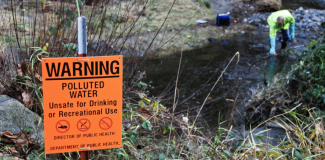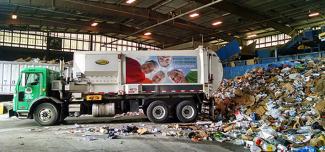At the outset of 2020, we looked forward to celebrating our 50 years of accomplishments, and to lifting up our work today for healthy people and a healthy planet.
As the global pandemic set in, we postponed the celebrations, and reconfigured our work. But we continued to share our stories. Even in the worst of times -- perhaps more than ever in the worst of times -- people need to know their history. Organizations need to know their history.
Well-told histories are critical to building and sustaining social movements. They provide critical context, and highlight how far we’ve come. To celebrate and sustain the Ecology Center’s work, even during the past year, we told our stories in this series featured on our website. We partnered with the University of Michigan History Department to create a website devoted to a more detailed overview of our work through the years.
Our priorities continue to be driven by the need to reimagine our material economy, energy, and transportation systems, and to put justice and sustainability at the center of that re-alignment. To achieve real sustainability no person can be expendable. No voices can be silenced. Our collective fate rests with the fate of the most marginalized.
While our principles stayed the same, the public health crisis demanded a shift in priorities:
In 2020, we pivoted our work to advocate against utility shut-offs across Michigan as pandemic job loss and poor policy precipitated a crisis. We joined with dozens of other advocacy groups to successfully persuade state policy makers to prohibit energy and water shut-offs during the pandemic.
As more and more families struggled to get by, the affordability of housing and utilities was an urgent problem in need of swift action. That’s why we and our partners have been working with the Michigan Public Service Commission (MPSC), advocating for comprehensive energy efficiency programs in low-income households. Low-income housing residents report leaky roofs, drafty windows, mold, poor plumbing, and even lead paint hazards. These poor living conditions contribute to respiratory and cardiovascular problems in addition to high energy bills. Families spend up to 15% of their income on energy bills. We work with the MPSC to design energy efficiency programs that include remediation such as roof repair and toxic mold cleanup.
Map of Covid-19 cases in correlation to air pollution in Detroit
The pandemic took its worst toll in major urban areas and communities of color, particularly in communities with existing air pollution problems, so we doubled down on our work there:
People with existing respiratory problems are far more susceptible to Covid-19. Prior to the pandemic, Detroit residents were three times more likely to be admitted to the hospital for asthma than other Michigan residents, and air pollution has been a long-standing community concern. It should have been no surprise that Covid was especially deadly in Detroit. Residents are exposed to elevated levels of pollutants from a variety of sources. That’s why we’ve been installing a network of air quality monitors to measure particulate matter across the city. We trained community members to use the air monitors, read the information, and use this information to advocate for clean air.
The transportation sector is one of the largest sources of air pollution in the United States, and the Ecology Center has been the leader of state and regional efforts to electrify the transportation sector. We lobbied the Michigan Public Service Commission to get Michigan’s utilities to install $23 million worth of charging sites for electric vehicles (EV’s) along highways, at multi-unit homes, and other public charging sites. These programs eliminate a large source of air pollution in Michigan and protect the health of Michiganders.
But it’s not enough. Auto industry observers estimate that the U.S. will need to quadruple its public charging stations in the next four years to meet demand. In Ann Arbor, we partnered with city officials to adopt an “EV Readiness” ordinance. The ordinance will require EV charging facilities to be included in any new construction, and will serve as a model for other communities around the state and country.
Lead, PFAS, and other toxic chemicals are also linked to worsened COVID outcomes, and we made major progress in our work to eliminate these chemicals from our communities:

PFAS exposure has been found to increase the risk of severe COVID illness, as well as diminish the effectiveness of vaccines. We helped develop Michigan’s new maximum contaminant level (MCL) standards for PFAS chemicals in drinking water, protecting the health of Michigan families.
In the past year, the City of Flint has come close to replacing all of the community’s lead drinking water pipes, and former Michigan Governor Rick Snyder was criminally charged for his role in the Flint Water Crisis. But the scourge of lead poisoning reaches far beyond drinking water systems, and far beyond Flint. The Ecology Center started the Great Lakes Lead Elimination Network to elevate the work of lead poisoning prevention in the region, and in the past year the Network grew to five states.
Our Healthy Stuff Lab conducted several groundbreaking studies, two of which investigated the presence of PFAS chemicals in the food system. Our work led eight major national retailers and restaurant chains to phase out PFAS in their packaging.
Our long-standing work in Washtenaw County was closely tied to global developments over the past year, and we saw three great new successes here:

In 2018, the recycling industry went into a tailspin when China banned U.S. recyclables. With the new shortage of processing facilities, recyclables piled up all across America. Some observers went so far as to warn of the collapse of the industry. Here in Michigan, the Ecology Center’s nonprofit social enterprise, Recycle Ann Arbor (RAA), stepped in with a solution. In 2020, RAA and the City of Ann Arbor agreed on an RAA plan to rebuild the City’s shuttered materials recovery facility, with $7 million of outside investment raised by RAA. The new facility is scheduled to reopen in November 2021, and will supply highest-end-use regional markets, addressing a need for processing capacity not just in Ann Arbor, but throughout southeast Michigan.
But recycling alone won’t solve the global waste crisis. To have a bigger impact, the Ecology Center and Recycle Ann Arbor co-founded the Alliance of Mission-Based Recyclers (AMBR) to rebuild credible, transparent recycling systems that serve as a bridge toward a circular economy and just, resilient local communities. This work is critical for the future of recycling, and our planet.
In Ann Arbor, we led a coalition that persuaded the city to adopt one of the country’s most ambitious carbon neutrality plans. The A2 Zero carbon neutrality plan would eliminate all of the community’s net carbon emissions by 2030. The University of Michigan is now following suit, and we’re now working to persuade the region’s other local governments and institutions.
The Ecology Center made it from 1970 to 2020 because thousands of people -- all of you, and many others -- supported us so very generously year after year, decade after decade. We made it from 2020 to 2021 because you were more generous than ever, and for that we are forever grateful. Thank you so much for your ongoing support!


